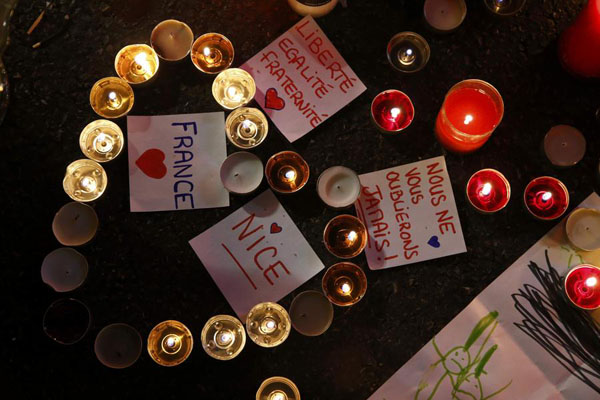Chinese tourism to France will 'drop sharply' following terror attack
By Angus McNeice in Nice and Chen Yingqun in Beijing (chinadaily.com.cn) Updated: 2016-07-18 17:32
 |
|
Burning candles, messages and a drawing pay tribute to victims of the truck attack along the Promenade des Anglais on Bastille Day that killed scores and injured as many in Nice, France, July 17, 2016. [Photo/Agencies] |
Tired from a day's travel but happy to be on honeymoon in the glamorous French Riviera, Frank Xu and Carina Xie from Yunnan arrived in Nice on Friday, July 15. They went for a romantic dinner then strolled through the warm air down the beach and back to the hotel. Frank turned on the news and saw for the first time the tragedy that occurred the night before in the Mediterranean city.
Zigzagging a truck along the Promenade des Anglais on Bastille Day, Tunisian-born Mohamed Lahouaiej Bouhlel mowed down hundreds of people, killing 84 and injuring 202, including two Chinese nationals who are recovering in hospital. He was killed after exchanging gunfire with police.
It was the third large-scale act of terrorism in France in 19 months, and the second for which self-styled Islamic State claimed responsibility. Thursday's mayhem reopens the emotional, social and economic wounds caused by the January and November 2015 killings in Paris — wounds that had barely begun to heal.
"If we had known the attack had happened we would have cancelled our trip, definitely," Frank, 28, an engineer from Kunming, Yunnan Province, said. "It's our honeymoon and France is a romantic place. We talked about the terrorism in Europe and thought maybe it's not happening anymore, so we came. But it's still happening — maybe we will choose a different place next time."
In 2014, the total contribution of travel and tourism to the economy of France was 289 billion euros, or 9.3 percent of France's total economy, according to Rochelle Turner, research director at the World Travel & Tourism Council (WTTC). Before last year's terror attacks, the WTTC anticipated the sector would grow by 3 percent in 2015. It declined by 0.8 percent to contribute 199 billion euros or 9.1 percent of GDP.
After the attack, Chinese travel operator Ctrip quickly helped Nice-bound clients to change plans and allowed visitors who paid to stay in hotels in the city from July 15-21 to cancel without charge.
Xu Xiaolei, chief branding officer at travel site Aoyou.com, expects the number of Chinese tourists going to France to drop sharply for several months.
"In the past our customers asked us about the best things to see and experience," he said. "Now they ask first whether a place is safe."
The impact on business in Nice was felt straight away. Claude Roques owns the restaurant O'Staff, off the commercial high street Boulevard Dubouchage. Part of his business is made through agencies booking tables for large groups. In the three days that followed the attack, cancellations totaled 400 diners.
Claude's son, Yoann, an associate at accommodation company Century 21 Domus Immobilier, was hit by six cancellations for seasonal rentals on Friday. While we spoke, a seventh came through: "We saw what happened," the email read. "Is it possible to get a refund?"
"People are divided in Nice," Yoann said. "Some are angry because they don't feel integrated."
Yoann references the suburb of L'Arianne and other parts on the outskirts of Nice where youth unemployment is high, especially in the large Arab population. Under-served urban areas like these are established targets for radical recruitment — most of those who left France to join now-deceased Islamic State recruiter Omar Omsen came from Nice.
On Friday, President Francois Hollande and Prime Minister Manuel Valls announced three days of national mourning and called for unity, before Valls invited a flood of criticism on social media for saying that France "is going to have to live with terrorism."
Xu Xiaolei says government response is key to lessening the impact of terrorism on the tourism industry in the long term.
"When 911 happened, we all thought that the tourism industry in the US would be destroyed, but it recovered quickly, when people saw the US government and its people's confidence in the situation," he said. "In the long term, I think Europe is still one of the destinations with the best travel resources and security."
There are now seven people in custody after the attack, including Bouhlel's ex-wife.
To contact the reporter: angus@mail.chinadailyuk.com







